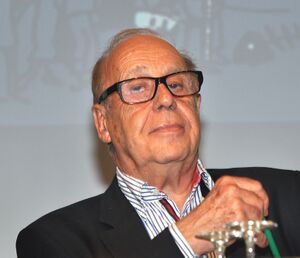Jean Ziegler
( diplomat, activist) | ||||||||
|---|---|---|---|---|---|---|---|---|
 | ||||||||
| Born | Hans Ziegler April 19, 1934 | |||||||
| Nationality | Swiss | |||||||
| Alma mater | • University of Bern • University of Geneva | |||||||
| Interests | • debt trap • “debt crisis” • vulture funds • biofuel | |||||||
"Hunger is [...] the main cause of death on our planet. And this hunger is man-made. Whoever dies of hunger, dies of murder. And this murderer's name is debt."
| ||||||||
Jean Ziegler is a former professor of sociology at the University of Geneva and the Sorbonne, Paris and former vice-president of the Advisory Committee to the United Nations Human Rights Council.
He has also held several other positions with the United Nations, especially as Special Rapporteur on the Right to Food from 2000 to 2008,[1] and as a member of the Advisory Committee of the UN Human Rights Council from 2008 to 2012. Jean Ziegler has authored numerous works, is a lecturer, and is well known for this sentence: "A child who dies from hunger is a murdered child."[2]
Contents
Early life and teaching career
Jean Ziegler was born on April 19, 1934 in Thun, Switzerland. His father was the president of the town’s court and a reserve artillery colonel.
Ziegler married and had one son. He studied at the universities of Bern and Geneva and has doctorates in Law and Sociology. He also earned his barrister brevet at the bar association of Geneva. In 1952, he met Abbé Pierre in Paris, and became the first director of the Emmaus charitable community of Geneva. In 1964, Ziegler admired the Cuban rebels, and was Che Guevara's chauffeur in Geneva.[3]
Ziegler was professor at the University of Grenoble and until 2002 at the University of Geneva and at the Graduate Institute of Development Studies, where he taught sociology. He also held the position of associate professor at the Sorbonne in Paris.
Election and appointment to public offices
In 1963 Jean Ziegler was elected at the municipal council of Geneva as a social democrat. From 1967 to 1983 and from 1987 to 1999 he held a seat at the Swiss National Council. While there he was the president of the “Swiss-Third World” parliamentary group. He joined the commissions for foreign affairs, science and international trade.
Nominated by Switzerland, he was the United Nations Special Rapporteur on the Right to Food from 2000 to 2008.[1]
Hunger
From 2000 to March 2008, he was appointed Special Rapporteur on the right to food of the Council of Human Rights of the United Nations.
As special rapporteur, he studied the level of nutrition and diet of the populations of many countries (Niger, Ethiopia, India, Bangladesh, Mongolia, Brazil, Palestine, Bolivia, Cuba, Guatemala, etc.), publishing each year a report on the situation for the United Nations General Assembly.
In 2005, in the book The Empire of Shame, he denounced the fact that:
hunger is [...] the main cause of death on our planet. And this hunger is man-made. Whoever dies of hunger dies of murder. And this murderer's name is debt”[4]
.
In the book, he also highlights the chronic malnutrition, or hidden hunger, which affects two billion people. The micronutrient deficiencies "cause often fatal diseases" (kwashiorkor, anemia, rickets, blindness.
Biofuels as a crime against humanity
As early as 2008, in the Report of the Special Rapporteur, he highlighted the harmful role of the increased cultivation of biofuels for the evolution of food prices on world markets:
“It is estimated that it takes around 200 kg of maize to fill the tank of a car with biofuel (around 50 liters), which is enough to feed a person for a year. There is therefore a great risk of creating competition between food and fuel that will leave the poor and hungry in developing countries at the mercy of rapidly increasing prices of food, land and water.”
Jean Ziegler (2008) [5]
In October 2011 when he no longer is special rapporteur, Jean Ziegler published Geopolitics of hunger in which he continues to denounce the scandal of malnutrition that continues in the 21st century. Thus, he qualified abandoning food crops in favor of biofuels as a “crime against humanity”:
The FAO annual report estimates that global agriculture today could normally feed 12 billion people, almost double that of humanity. On the threshold of this new millennium, this is no longer a question of destiny, no objective lack. The planet is drowning in wealth. A child who dies of hunger, is murdered.[6]
He is a member of the sponsorship committee of the Russell Tribunal on Palestine, whose work began on March 4, 2009.
References
- ↑ Jump up to: a b http://www.ohchr.org/EN/Issues/Food/Pages/FoodIndex.aspx
- ↑ "Un enfant qui meurt de faim est un enfant assassiné." (Destruction massive: Géopolitique de la faim, Paris, Seuil, 2011.)
- ↑ Bollag, Burton. "For One Swiss Professor, Vexing His Fellow Citizens Is a Duty and a Delight", Chronicle of Higher Education (1998-10-23).
- ↑ L’Empire de la honte, Paris, Éditions Fayard, 2005, page 118
- ↑ http://archive.wikiwix.com/cache/?url=http%3A%2F%2Fdaccess-dds-ny.un.org%2Fdoc%2FUNDOC%2FGEN%2FG08%2F100%2F99%2FPDF%2FG0810099.pdf%3FOpenElement
- ↑ http://archive.wikiwix.com/cache/?url=http%3A%2F%2Fwww.bastamag.net%2FJean-Ziegler-Les-speculateurs